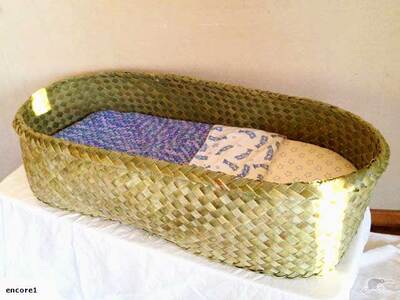The Ministry of Health announced last year that they will work with researchers and other paediatric experts to develop a programme using pēpi pods, to help save babies lives.
But as the programme stands only certain babies (the most vunerable) will get access to them, not all babies.
Recent research released findings showed that pepi pods/wahakura are safe and in fact significantly increased the level of breastfeeding, as the baby is in arms reach.
(Read the full article here:
http://www.nzherald.co.nz/nz/news/article.cfm?c_id=1&objectid=11779101)
It's super that we now have the science to back us up and this makes our case for the government rolling out a nationwide scheme even stronger! What we need to do now is gather our voices, make noise, spread the word and collect more signatures to make this campaign bigger and bolder. Let's tell the government that all New Zealand babies/pepi are precious and deserve a safe space to sleep in. We demand action!
If you haven't already, you can write to the Minister or give his office a call, as it’ll let him know that we’re not going away. Here are his details: (email) jonathan.coleman@parliament (phone) 09 419 8021
Please can you share this message with your family, friends, colleagues and all people who love babies.
---------------------------
New Zealand has the worst rate of Sudden Unexpected Death in Infancy (SUDI) in the industrialised world. Every year 50 babies die from SUDI, with half being accidentally smothered by parents. Māori babies are eight times more likely to die from accidental suffocation because of high smoking rates and the cultural custom of bed-sharing. A sleeping device, a wahakura or pēpi-pod, was designed in 2006 to prevent deaths while bed-sharing.
http://m.nzherald.co.nz/nz/news/article.cfm?c_id=1&objectid=11673356
Pēpi-pods/wahakura allow parents or caregivers to sleep close to their babies while allowing pēpi to stay safe in their own individual space. Being close to your baby is important to be able to respond sensitively and remain in tune during the first few weeks of life. Pēpi-pods/wahakura support cultural values of co-sleeping within our Māori and Pacific families and communities.
Internationally renowned cot death expert Professor Ed Mitchell, of the University of Auckland, believed in the device from day one. "When David [Tipene-Leach] first invented the wahakura, I stuck my neck out very early on and supported this Māori initiative," he says. With the right prevention strategies in place, such as a national pēpi-pod programme and targeted anti-smoking campaigns, Mitchell believes New Zealand's SUDI rate could be cut down from 50 deaths a year to as few as five. "In my heart, I know we can get it down.".
http://m.nzherald.co.nz/nz/news/article.cfm?c_id=1&objectid=11670826
The recent fall in post perinatal mortality in New Zealand and the Safe Sleep programme.
Mitchell EA, Cowan S, Tipene-Leach D.
The deaths of babies in New Zealand in their first month of life was reduced by 29% from 2009-2015. The reduction was most prominent in Māori infants. This recent fall is likely to be due to a combination of strategies including; pēpi-pods/wahakura and educational intiatives. Over 16, 500 pēpi-pods/wahakura have been distributed nationwide due to this safe sleep programme.
http://www.ncbi.nlm.nih.gov/pubmed/27254483

